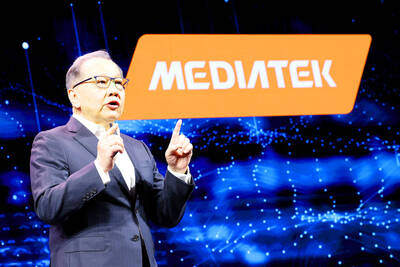Taiwan Semiconductor Manufacturing Co (TSMC, 台積電), which counts Nvidia Corp as a key customer, yesterday said that artificial intelligence (AI) server chip revenue is set to more than double this year from last year amid rising demand.
The chipmaker expects the growth momentum to continue in the next five years with an annual compound growth rate of 50 percent, TSMC chief executive officer C.C. Wei (魏哲家) told investors yesterday.
By 2028, AI chips’ contribution to revenue would climb to about 20 percent from a percentage in the low teens, Wei said.

Photo: Sam Yeh, AFP
“Almost all the AI innovators are working with TSMC to address the incessant AI-related demand for energy-efficient computing power,” Wei said. “We expect AI server processors to become the strongest driver of our high-performance computing product growth and the largest contributor to our overall revenue growth in the next few years.”
A surge in AI chip demand is fueling the firm’s advanced technologies, including 4-nanometer, 3-nanometer and 2-nanometer process technologies, as customers aim to address the critical issue of power consumption at data centers.
All AI chips being made by the chipmaker utilize its 5-nanometer or 4-nanometer technology, the company said.
AI technology is evolving to use ever-increasingly complex models, which need to be supported by more powerful hardware and the most advanced process technologies, TSMC said.
As a result, TSMC expects 3-nanometer chip revenue this year to triple from last year and is looking at a meaningful revenue contribution by 2-nanometer chips in the first quarter of 2026 following the start of volume production in the second half of next year.
A scarcity of advanced packaging capacity is also being caused by the AI boom. TSMC said the capacity of chip-on-wafer-on-substrate technology would remain tight this year even though it plans to more than double its capacity and leverage the capacity of its partners.
“Demand is extremely high. We have done our best to increase capacity to alleviate the shortage,” Wei said.
TSMC yesterday retained its revenue growth forecast at 20 to 25 percent for this year, and kept its capital expenditure unchanged at between US$28 billion and US$32 billion, but the chipmaker cut its revenue forecast for global semiconductor growth to 10 percent, compared with its earlier estimate of more than 10 percent, which it attributed to a lukewarm pickup in PC and smartphone demand.
Demand for chips used by automakers has also fallen short of expectations, the company said.
TSMC expects revenue this quarter to grow about 6 percent to between US$19.6 billion and US$20.4 billion, from US$18.87 billion last quarter, supported by strong demand for 3-nanometer and 5-nanometer technologies.
Gross margin is expected to drop to between 51 percent and 53 percent this quarter from 53.1 percent last quarter, factoring in the impact of higher electricity rates and the losses of some wafers and materials during the earthquake that rocked Taiwan on April 3.
TSMC’s net profit last quarter beat market expectations, expanding 8.9 percent to NT$225.49 billion (US$6.96 billion) from NT$238.71 billion a year earlier.
That was the best first-quarter profit in the chipmaker’s history and it translated into earnings per share of NT$8.70, up from NT$7.98 the previous year.

Taiwanese suppliers to Taiwan Semiconductor Manufacturing Co. (TSMC, 台積電) are expected to follow the contract chipmaker’s step to invest in the US, but their relocation may be seven to eight years away, Minister of Economic Affairs J.W. Kuo (郭智輝) said yesterday. When asked by opposition Chinese Nationalist Party (KMT) Legislator Niu Hsu-ting (牛煦庭) in the legislature about growing concerns that TSMC’s huge investments in the US will prompt its suppliers to follow suit, Kuo said based on the chipmaker’s current limited production volume, it is unlikely to lead its supply chain to go there for now. “Unless TSMC completes its planned six

Intel Corp has named Tasha Chuang (莊蓓瑜) to lead Intel Taiwan in a bid to reinforce relations between the company and its Taiwanese partners. The appointment of Chuang as general manager for Intel Taiwan takes effect on Thursday, the firm said in a statement yesterday. Chuang is to lead her team in Taiwan to pursue product development and sales growth in an effort to reinforce the company’s ties with its partners and clients, Intel said. Chuang was previously in charge of managing Intel’s ties with leading Taiwanese PC brand Asustek Computer Inc (華碩), which included helping Asustek strengthen its global businesses, the company

Power supply and electronic components maker Delta Electronics Inc (台達電) yesterday said second-quarter revenue is expected to surpass the first quarter, which rose 30 percent year-on-year to NT$118.92 billion (US$3.71 billion). Revenue this quarter is likely to grow, as US clients have front-loaded orders ahead of US President Donald Trump’s planned tariffs on Taiwanese goods, Delta chairman Ping Cheng (鄭平) said at an earnings conference in Taipei, referring to the 90-day pause in tariff implementation Trump announced on April 9. While situations in the third and fourth quarters remain unclear, “We will not halt our long-term deployments and do not plan to

NOT OVERLY PESSIMISTIC: While consumer electronics demand remains volatile, MediaTek CEO Rick Tsai said that tariffs would have limited effect on the company Chip designer MediaTek Inc (聯發科) yesterday said revenue this quarter would contract by 4 percent sequentially in the worst-case scenario on softer smartphone demand. Revenue is expected to be between NT$147.2 billion and NT$159.4 billion (US$4.6 billion-US$4.98 billion), compared with NT$153.31 billion last quarter, the company said. MediaTek said demand for smartphone chips would be flat or slide sequentially this quarter, while demand for smart devices and power chips would go up. Mobile phone chips made up 56 percent of the company’s total revenue last quarter. Gross margin of 46 to 49 percent is forecast for this quarter, compared with 48.1 percent last